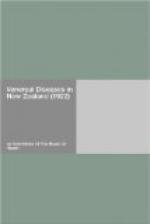The Committee are of the opinion that by the strict exercise of the provisions of section 111 of the Health Act, 1920, much may be done to prevent introduction of venereal diseases from overseas. They suggest, however, that where any person so suffering is required or permitted to attend a clinic he should be accompanied by some responsible officer of the ship, or person authorized by the shipping company concerned, and that the question on the “Report of Master of the Ship” defined by regulations—“Are you aware of the presence on board of any person suffering from ... (b) venereal disease?”—might be strengthened by adopting the Australian quarantine service equivalent viz., “Is there now or has there been on board during the voyage any person suffering from demonstrable syphilis in an active condition, or other communicable disease?”
The evidence given does not show that the number of venereal-diseases cases already in the Dominion is greatly added to by the introduction of cases from overseas. Since 1903 persons suffering from syphilis have been “prohibited immigrants” within the meaning of the Immigration Restriction Act.
SECTION 5.—PROPHYLAXIS.
Before discussing this question it is desirable clearly to distinguish between the procedures which are included under this term. These are—
(1.) The supply of drugs and appliances which are made available for use by the individual before exposure to infection. This may be described as “anticipatory prophylaxis,” and has commonly been designated the “packet system.”
The Committee condemn this procedure, for these reasons: (i) That the system suggests a moral sanction to vice; (ii) that the individual is lulled into a false sense of security, and may thereby be encouraged repeatedly to expose himself to infection; (iii) that the individual may be thereby deterred from seeking early advice or treatment; (iv) that the drugs supplied may be used for treating disease should it arise, and so delay may result in seeking skilled treatment in the early stages when it is likely to be most effective.
(2.) Treatment applied after exposure to infection. This is called “early treatment.” This term is inapplicable, as a disease cannot be treated before it exists. It is also likely to be confused with “abortive treatment,” which implies treatment immediately on the appearance of symptoms.
The evidence before the Committee shows that this form of prophylaxis, if applied by skilled persons and within a few hours of exposure, is effective in preventing disease in a great majority of the cases in which it is used.
The Inter-departmental Committee on Infectious Diseases set up by the Ministry of Health in 1919 in connection with demobilization, in a note on “Prophylaxis against venereal disease,” reported among its




